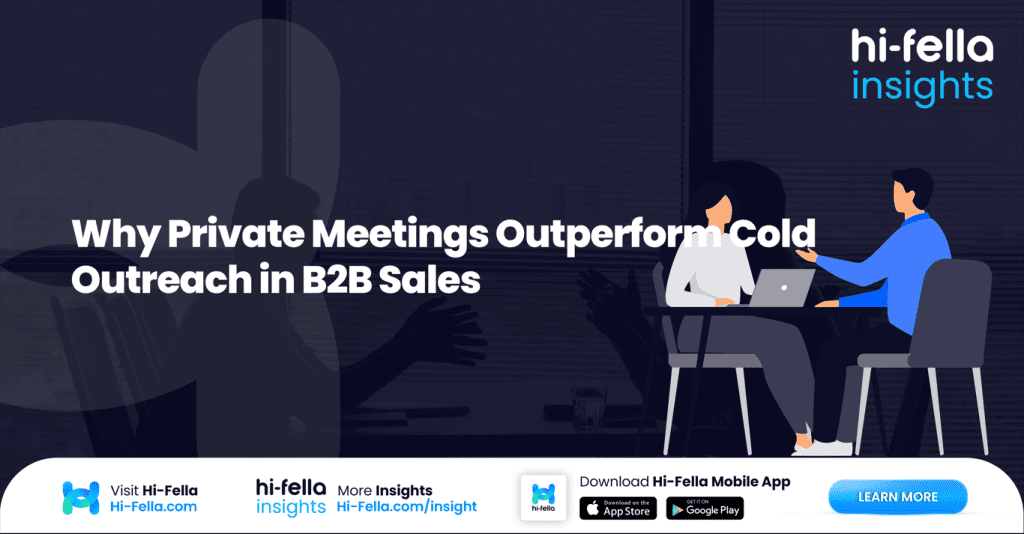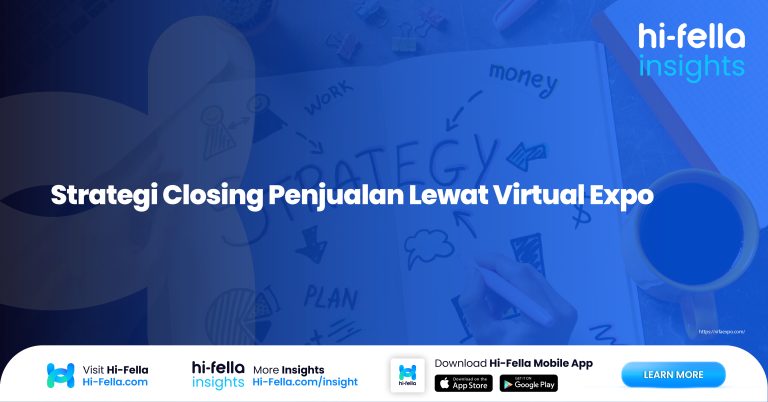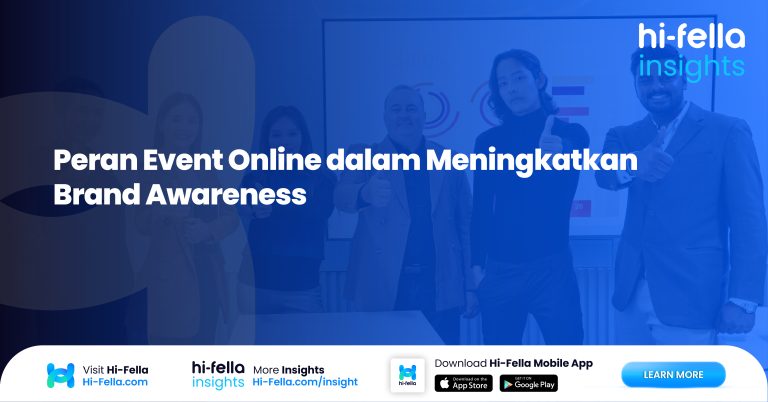In B2B commerce, especially in global export-import trade, the sales landscape is shifting. The days of mass cold emails and untargeted LinkedIn messages yielding high conversion rates are behind us. Attention spans are shorter. Buyers are more informed. And the market is oversaturated with companies vying for the same contracts.
So, why are some B2B sellers still landing deals faster, building deeper trust, and getting better margins?
Because they’ve pivoted from cold to curated. Specifically, they’re investing in private B2B meetings, a focused, personalised, and high-intent approach that consistently outperforms traditional cold outreach.
This article breaks down why cold outreach is losing effectiveness, how private meetings deliver outsized ROI, and how platforms like Hi-Fella are operationalising these meetings at scale for global trade players.
The Decline of Cold Outreach in B2B
Cold outreach used to be the default strategy in B2B. Email campaigns, scripted calls, and LinkedIn automation were enough to start conversations. But the landscape has changed—drastically.
Here’s why:
1. Buyers are overwhelmed.
According to Gartner, B2B buyers spend only 17% of their buying journey meeting with potential suppliers. The rest is spent doing independent research or internal alignment. If you’re one of 50 messages in their inbox, you’re likely ignored.
2. Trust is scarce.
Cold outreach doesn’t build trust. It creates noise. And in high-value cross-border trade, trust is the currency. You can’t open with “Dear Sir, we are leading manufacturer…” and expect serious engagement.
3. Relevance is low.
Even with sophisticated targeting tools, cold outreach often misses context. The buyer might not be sourcing at the time, or your pitch might not match their specific compliance needs or market strategy.
4. Regulations are tightening.
GDPR and similar regulations in other regions (like PDPA in Malaysia or LGPD in Brazil) make unsolicited outreach not only ineffective—but risky.
This doesn’t mean outbound is dead. It means the form it takes needs to evolve. And that’s where curated, private meetings come in.
Why Private B2B Meetings Work
Private meetings are not just scheduled calls. They are intent-rich, curated interactions with shared context, mutual interest, and purpose. Let’s explore what makes them superior.
Relevance is Guaranteed
Private B2B meetings—especially those arranged via platforms like Hi-Fella—are pre-qualified. Buyers are vetted, suppliers are matched based on product-market fit, and the topics of discussion are scoped beforehand.
This drastically improves the signal-to-noise ratio.
For instance, an OEM electronics brand in Europe might be looking for lithium battery manufacturers that already comply with UN38.3 and EU RoHS directives. A cold email from a generic battery producer might be ignored—but a private session pre-matched by category, certification, and volume capacity? That’s worth showing up for.
Shorter Sales Cycles
Private meetings accelerate decision velocity. Why? Because both parties enter with clarity.
According to HubSpot’s 2024 B2B Sales Report, deals initiated through targeted appointments close 36% faster than those from cold email threads.
In a private meeting, the buyer already knows what they’re looking for, and the seller already knows what problem they’re trying to solve. There’s no fluff—just alignment.
And when Hi-Fella handles the matchmaking, even better. Their system uses trade category data, documentation readiness, market interest, and buyer budgets to facilitate meetings that are designed to move forward.
Relationship Depth
In export-import trade, buying decisions aren’t transactional—they’re relational. Buyers want long-term partners who can deliver consistent quality, adapt to market needs, and offer regulatory foresight.
Private meetings allow sellers to:
- Demonstrate product samples in real time (virtually or physically)
- Explain how they solve specific logistics or documentation hurdles
- Explore collaboration models beyond just price (e.g., exclusivity, co-branding, after-sales support)
This moves the conversation beyond unit cost into strategic value—something a cold email can never achieve.
Trust Through Facilitation
When a neutral, trusted platform like Hi-Fella facilitates the meeting, trust goes up. Both sides perceive it as less transactional and more credible.
Hi-Fella’s B2B showcases, webinars, and private trade events are curated with input from:
- Industry associations
- Chambers of commerce
- Government trade promotion agencies
- Export credit insurers and customs brokers
This ensures the meeting is backed by a layer of legitimacy that neither side can achieve alone.
Higher Conversion Rates
Let’s talk numbers. Various B2B trade platforms and marketplaces have reported the following trends:
- Cold email conversion rates: 1–3% (source: Mailchimp, 2023)
- LinkedIn cold outreach: 2–5% (source: Sales Navigator Data, 2023)
- Private B2B meetings conversion rate: 15–25% (Hi-Fella internal data, 2024; similar results noted by Alibaba B2B Matchmaking and Enterprise Singapore)
The difference is stark. When the meeting is curated, qualified, and timed right, the probability of success multiplies.
Hi-Fella’s Private Meeting Framework
So how does Hi-Fella operationalise this model globally? Through a structured but flexible 4-part framework:
Intelligent Matching
Using its proprietary trade data and profile tagging system, Hi-Fella matches buyers and sellers not just by product but also:
- Certifications (ISO, CE, FDA, HALAL)
- Volume capacity and delivery timelines
- Geographical target markets
- Deal size expectations
This ensures that both parties walk into the meeting prepared and aligned.
Pre-Meeting Onboarding
Both buyer and seller receive pre-meeting intel:
- Company profile of the other side
- Product catalogue (for sellers)
- Procurement brief (for buyers)
- Compliance background
This makes the actual meeting productive from minute one, with no time wasted on introductory fluff.
Expert Moderation (Optional)
Hi-Fella offers optional moderation services—where a trade consultant, compliance expert, or neutral facilitator guides the meeting.
This is especially valuable when:
- Language barriers exist
- Technical details need clarification
- Negotiation power is asymmetric (e.g., SME seller vs. global buyer)
Moderation ensures focus, fairness, and follow-through.
Post-Meeting Follow-Up Engine
Hi-Fella’s CRM-lite dashboard helps both parties:
- Document meeting outcomes
- Track action items
- Schedule sample shipments or compliance clarifications
- Book follow-up sessions
No more lost leads in inboxes. Everything is structured.
Cold Outreach Still Has a Place—But Use it Strategically
We’re not saying cold outreach is dead. In fact, for early brand awareness or nurturing passive buyers, it still has merit. But its conversion rate is dropping in high-value B2B sales, especially in global trade.
The smarter strategy is this:
- Use outbound for top-of-funnel awareness
- Use private meetings for mid-to-bottom funnel engagement
- Use platforms like Hi-Fella to bridge the two—turning passive interest into focused interaction
It’s Not About Selling, It’s About Solving
In today’s B2B world, especially in export-import ecosystems, buyers don’t want to be sold to. They want to be understood. Cold outreach offers volume. But private meetings offer insight, empathy, and relevance.
By curating private, high-trust conversations, platforms like Hi-Fella aren’t just changing the sales channel. They’re changing the sales experience.
If you’re an exporter, importer, manufacturer, or distributor aiming to scale in international markets, don’t chase leads. Curate meetings. Build trust. And trade smarter.
Join Hi-Fella Today!
When it comes to B2B sales in the export-import world, private meetings consistently outperform cold outreach — and Hi-Fella makes these connections effortless. By facilitating secure, focused, and verified one-on-one meetings, Hi-Fella helps you build genuine relationships with serious buyers and suppliers, accelerating trust and closing deals faster.
If you’re ready to move beyond the noise of cold calls and foster meaningful partnerships that drive real growth, Hi-Fella is the platform designed to transform your sales approach and unlock your business’s true potential.








